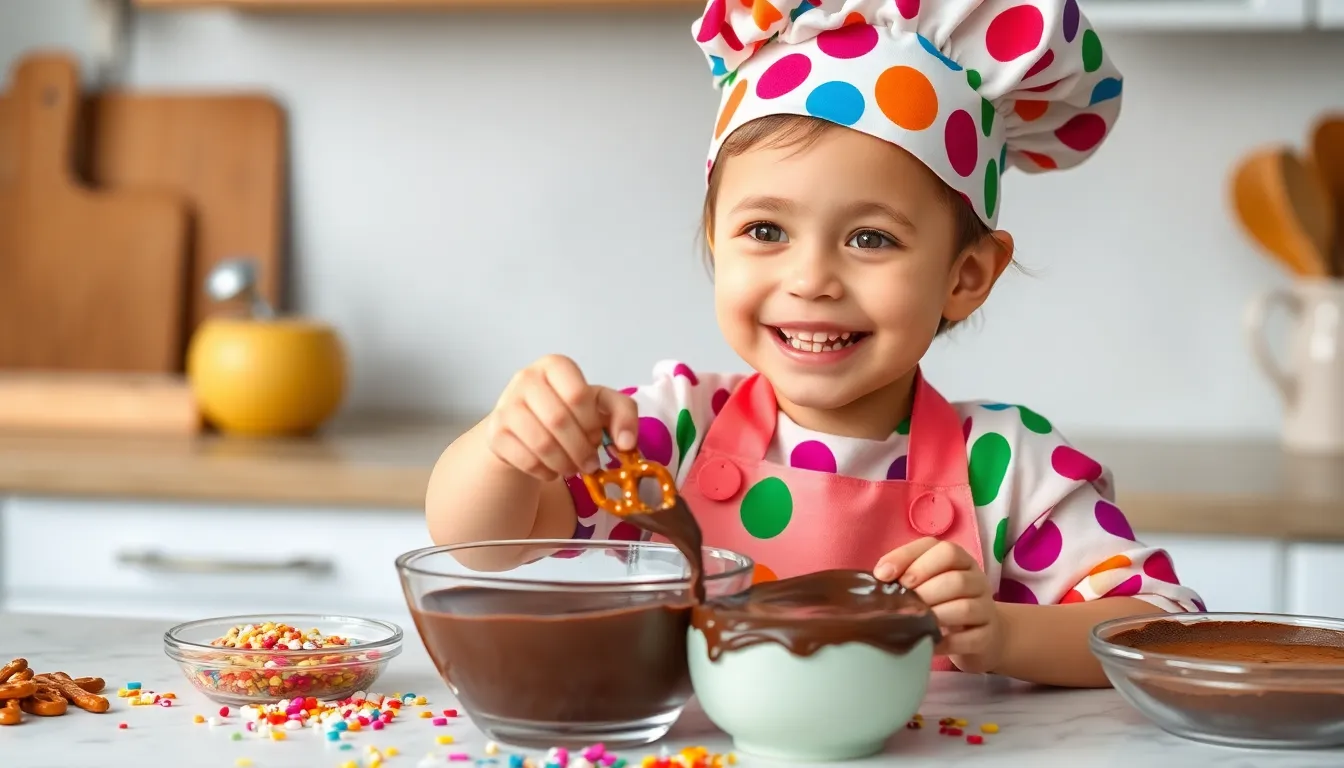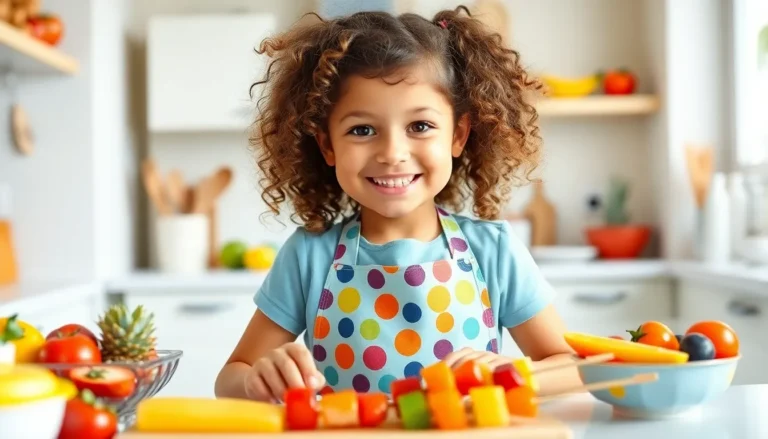Table of Contents
ToggleCooking with preschoolers isn’t just about mixing flour and water; it’s a delightful recipe for fun and learning. Picture tiny hands covered in dough, laughter echoing through the kitchen, and the sweet smell of cookies baking in the oven. These cooking activities do more than just fill little tummies—they spark creativity and teach essential skills in a playful way.
Imagine turning a simple snack into a culinary adventure. From measuring ingredients to following simple directions, kids gain confidence and a sense of accomplishment. Plus, they’ll learn about nutrition while having a blast. So grab that apron and get ready to whip up some unforgettable memories. After all, who wouldn’t want to be a chef in their own kitchen?
Benefits Of Preschool Cooking Activities
Cooking activities offer preschoolers numerous advantages that go beyond simple enjoyment. Engaging them in the kitchen supports their overall development and fosters essential lifelong skills.
Enhancing Fine Motor Skills
Utilizing child-friendly kitchen tools develops fine motor skills. Tasks like pouring ingredients or rolling dough require precise hand movements. Children enhance their hand-eye coordination while mixing, measuring, and cutting. Repeated practice improves dexterity. As they manipulate various utensils, kids gain confidence in their abilities. This practical experience lays a foundation for future tasks like writing and self-care.
Promoting Healthy Eating Habits
Involving preschoolers in cooking encourages healthy eating habits. By choosing fresh ingredients together, children learn the importance of nutrition. Exposure to various fruits and vegetables fosters curiosity about food. Cooking together provides opportunities to discuss the benefits of balanced meals. Kids often develop a preference for homemade meals over processed options. As they cook, they relate food preparation to health and wellness. This connection supports positive attitudes toward nutrition later in life.
Fun Cooking Activities For Preschoolers

Cooking activities for preschoolers create enjoyable learning experiences. Exploring simple recipes and hosting themed cooking days enhance engagement and skill development.
Simple Recipes To Try
Start with no-bake recipes like chocolate-covered pretzels. Use melted chocolate to dip pretzels, allowing children to sprinkle toppings. Finger foods such as fruit kabobs encourage creativity and collaboration. Kids can thread pieces of fruit onto skewers, enjoying colorful, tasty treats. A mini pizza-making session allows preschoolers to create personalized pizzas, using dough and various toppings. Onions, bell peppers, and cheese can turn into masterpieces. Cooking is fun when children participate actively in simple yet delicious dishes.
Themed Cooking Days
Choose specific themes for cooking days to spark excitement. For example, an Italian theme can involve making spaghetti and meatballs. Kids can shape meatballs and experience the fun of rolling dough. Create a “Rainbow Day” by preparing colorful smoothies with fresh fruits. This activity teaches color recognition and healthy choices. A “Dinosaur Day” might include making dino-shaped sandwiches, fostering imagination and play. Each theme offers a unique opportunity for preschoolers to learn while enjoying time in the kitchen.
Safety Tips For Cooking With Preschoolers
Engaging preschoolers in cooking requires attention to safety. Specific guidelines ensure a fun and secure environment for little chefs.
Kitchen Safety Rules
Teach children to wash their hands before cooking to prevent germs. Use child-friendly utensils to reduce the risk of accidents while handling tools. Set boundaries around hot surfaces, such as stoves and ovens, to keep children at a safe distance. Encourage them to stay focused on their tasks by minimizing distractions in the kitchen. Explain the importance of cleaning up spills promptly to avoid slips and falls. Incorporate a fire safety plan that includes knowing what to do in case of an emergency.
Supervision Guidelines
Active supervision is essential during cooking activities. Stay close to children while they use kitchen tools and ingredients. Monitor their interactions with hot surfaces and appliances consistently. Assign specific, age-appropriate tasks to ensure they remain engaged. Encourage conversation about what they’re doing to reinforce learning and safety awareness. Maintain open communication about potential hazards, creating an environment where they feel comfortable asking questions.
Incorporating Learning Into Cooking
Cooking activities provide natural opportunities for young children to learn essential skills. Engaging in the kitchen allows preschoolers to incorporate various educational aspects.
Math Skills Through Measuring
Measuring ingredients serves as an effective method for teaching math concepts. Preschoolers practice counting while scooping flour or pouring milk. They gain familiarity with measurements such as cups and tablespoons. Recognizing volumes enhances their understanding of spatial awareness and comparison. Using simple recipes that require fractions introduces a foundational grasp of math. By engaging in hands-on activities, they associate learning with fun.
Language Development With Cooking Instructions
Following recipes can significantly boost language development among preschoolers. They learn new vocabulary related to cooking techniques, ingredients, and kitchen tools. Listening to instructions promotes comprehension and enhances communication skills. Children expand their language through discussions about the steps involved in preparing meals. Encouraging them to describe their tasks fosters expressive language skills. Cooking activities not only strengthen linguistic abilities but also build confidence in verbal interactions.
Cooking with preschoolers is a delightful way to nurture their creativity and foster essential life skills. These activities not only engage children in the kitchen but also lay the foundation for healthy eating habits and nutritional awareness. By participating in fun and interactive cooking sessions, kids develop fine motor skills and confidence while learning valuable lessons about teamwork and safety.
The joy of creating meals together can lead to lasting memories and a positive relationship with food. Encouraging young chefs to explore various recipes and themes enriches their learning experience. With proper guidance and supervision, parents can transform cooking into an enjoyable educational adventure that benefits both children and families alike.





